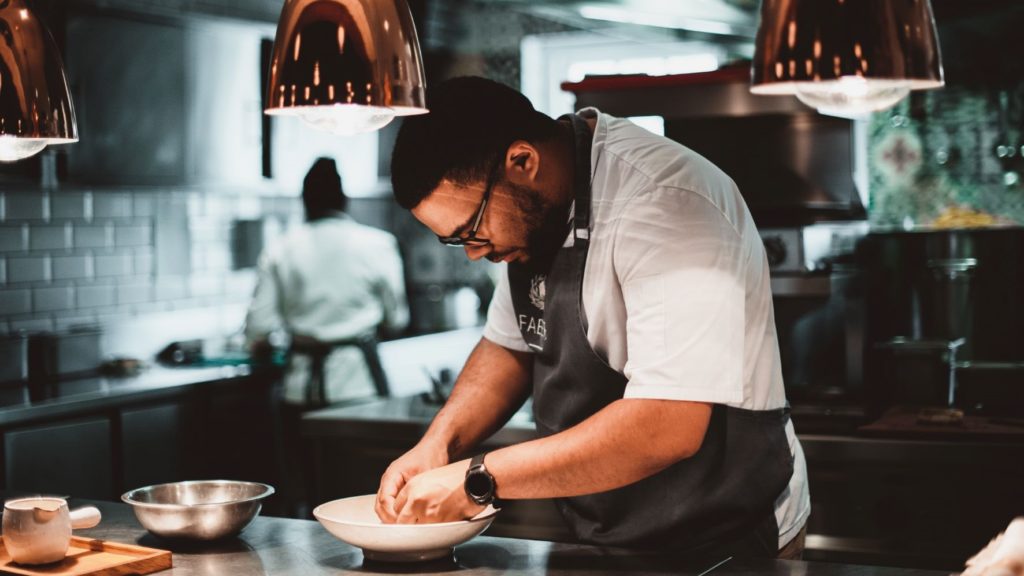Situated in the beautiful Avondale Wine Estate, outside Paarl on the slopes of the Klein Drakenstein Mountains, FABER is one of Africa and South Africa’s leading restaurants.
Representing the synergy of two craftsmen, namely chef Dale Stevens and Avondale’s proprietor, Johnathan Grieve, FABER is a contemporary ‘farm-to-fork’ restaurant. It approaches each ingredient with the utmost respect and aims to take visitors on an inspirational, thought-provoking journey that celebrates the bountiful goodness of nature.
“Our restaurant is literally a stone’s throw from the garden,” says Chef Dale. “So, when we say ‘farm-to-fork’, we mean it quite literally.
A typical morning’s ritual involves harvesting what is ripe and ready to be pulled or picked from the farm’s abundant garden. Seasonality forms the foundation of the daily changing menu, depending on what the chefs harvest from the gardens and fields. “Even out waiters are known to pick lemons directly from the garden for use in refreshing fruit cordials, served as welcome drinks on hot days,” adds Chef Dale.

A focus on specific ingredients, has seen Chef Dale able to refine FABER’s offering over the years. Summer salads feature brightly coloured watermelon radishes, while young and tender leeks of early summer are caramelised and served with medium-rare grass-fed steak. The likes of carrots or cucumbers may differ in size and shape, but here Mother Nature’s perfection is measured more by intense and nutrient dense flavour rather than looks. From root vegetable to delicate herbs and salad leaves, all products are farmed using the exact same biodynamic principles as the grapes that go into Avondale Wine Estate’s award-winning wines.
“We are mindful of using everything, rather than considering it as a waste,” explains Chef Dale. “You could say we apply the cooking principle of ‘nose to tail’ to our vegetables, too – I call it ‘root-to-leaf,” he adds. Anything that doesn’t get used forms part of a strict recycling system an all food waste is composted using Bokashi.
“Our cows are fed on a pasture ‘salad bar’ and are moved every afternoon at 2 pm to a new pasture. Pastures reach a nutrient high at this time of day,” continues Chef Dale. “This results in cows eating less but gaining more energy – all of which positively influences the quality and flavour of the meat.” Lesser-known cuts of an animal (beef cheeks, tongue, etc.) are given more flavour by using age-old preserving methods such as pickling and brining. Fish and other ingredients are cold smoked to retain the delicate flavours.

“If an ingredient cannot sourced from the farm, we rely on a handful of carefully selected and trusted suppliers who share a common reverence with us for provenance and the ethics of food,” continues Chef Dale. “Long before we start working in the kitchen, the flavour and nutritional content of an ingredient is influenced by the health of the soil in which it is grown.”
The entire farm is certified organic and constantly pushing the boundaries of the latest advances in sustainable practices. FABER’s slow-food dining philosophy is perfectly aligned to Avondale Wine Estate’s minimal-intervention approach to organic viticulture and natural winemaking.
Regular practices include the use of biodynamic preparations to build the organic matter of the soil, seasonal crop rotation, companion planting and the use of cover crops (such as clover) to actively enrich the soil.
“Our sustainability goals extend beyond only ethical food sourcing and the resourcefulness of taking a ‘nose-to-tail’ and ‘root-to-leaf’ approach to cooking,” continues Chef Dale.
FABER’s responsible management of food waste encompasses the principle of four Rs: recycle, reduce, reuse or refuse. The restaurant only uses glass bottles and reusable straws, towels, and napkins. Glass and plastic is recycles, as is cooking oil. Further, eggshells are used in biodynamic preparations and all the organic kitchen waste is made into compost. “This goes back into the soil to create microbial life, thereby completing the circle of life,” explains Chef Dale.
What to expect this spring and summer?
The spring and summer menus usually showcase a beautiful selection of berries and greens: blueberries, strawberries, gooseberries, asparagus, broad beans, peas, sugar snap peas, brussels sprouts, broccoli, and cabbage.
In line with its ‘farm-to-fork’ approach and making use of what nature provides, Chef Dale does not plan any of his menus too far ahead. Spontaneity is key and an absolute differentiator when it comes to the menus available at FABER Restaurant.
Some current selections include:
- Starter: lemon buttered potato angel hair, selection of greens, broad beans, mange trout, sugar snap pea, crispy potato nest, Tanglewood goats’ cheese.
- Main: fricassee of steamed green asparagus, shimeji, portobellini and button mushrooms, basil, baby onions, braised gem lettuce, potato gnocchi and homemade ricotta.
- Dessert: soft mascarpone mousse, poached guava, blueberries, sumac meringue, lemon and thyme streusel and guava sorbet.
ALSO READ: Fine dining and breathtaking views at Jordan Restaurant
Feature image: Supplied
Written by Tauhira Ajam for Cape {town} Etc.

